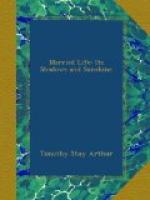Percy showed no inclination to continue the subject. His manner plainly enough indicated that the conversation had given him no pleasure; and that he believed the mother of Kate to have exceeded the privilege of her position. When they parted, it was with the most formal politeness on both sides.
After Mrs. Harrison parted with Percy Edwards, the young man remained alone for nearly an hour. Sometimes he walked the floor with hurried steps, his manner greatly excited; sometimes he sat beside a table, with his head leaning upon his hand, so buried in thought as to be almost motionless; and sometimes he muttered to himself, as he aroused up from these fits of abstraction.
“Ah me!” he sighed, at last, rising slowly from his chair, and beginning to walk about, but with less agitation of manner than before exhibited. “This was a great mistake,—the one great error of my life. How blind I was not to have foreseen just such a result as this! I never had the smallest impulse of affection for her, and never can have. Both are unhappy in our bonds, and both will be so until death severs the unnatural tie. Ah me! A hundred thousand as a marriage portion, doubled on my own side, with half a million in prospect, does not put a single drop of honey in this cup, which grows more bitter with every draught. The worldly advantage is all very well. I am satisfied with that. But it comes at too heavy a cost. And poor Kate”—there was something of pity in the tone with which this was uttered—pity, not tenderness—” she has been the most wronged in this business. But the alliance was of her father’s own seeking. His were the offered inducements, and I am not to be blamed if the temptation proved too strong for me. To a great extent, I can protect myself, though not fully. There are, thorns in my pillow which can neither be covered nor removed. Ah me! I wish Kate would seek, as I do, in coldness and indifference, the protection she needs. Her mother’s observation is correct. There is no tenderness in my manner, and I have not meant that there should be. I have not treated her unkindly, for I wished to avoid all cause for complaint or reproach. I wished to stand clear before the world; and I am clear. If she beat herself against the bars of her cage, am I to blame? No, no! Let her yield to the necessity of her position, as I do. Let her avail herself of all the sources of forgetfulness within her reach—and there are many—and live passionless, if not happy. But she will not. If some speedy change do not take place, she cannot live a year. The world is quick in its imputation of wrong; and a whisper from her friends may thrill a thousand hearts with a suspicion of foul play, if she go down to the grave in so short a period after our marriage. And there is yet another consideration,—my interest in her father’s large estate. How will that be affected? Having sacrificed so much for this consideration, it must not be abandoned now.”




